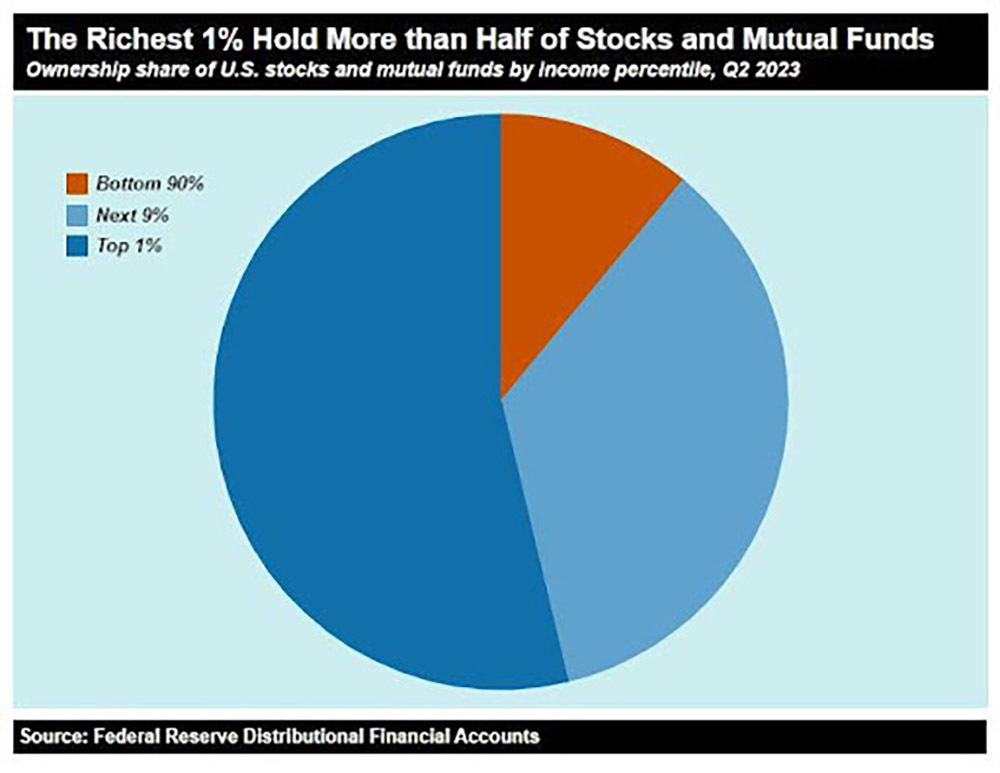With the digital revolution, virtual money, global online communication, giant asset-management corporations, and share-holder priorization, the system has gone astray: it is an environmental, social and financial chaos machine.
(Ladislau Dowbor)
Give big banks and multinationals what they ask for, look the other way when they behave badly, then watch the wealth spring up and trickle down.
(Nicholas Shaxson, The Finance Curse, 2019) (134)
We are invaded by such a flow of news, fake-news, commercial journalism, behavioral marketing, hate messages, and just plain stupidity, that we have trouble to discern what is effectively happening, what are the meaningful events, what are the structural challenges. Every today explodes in our face, drowning out the yesterdays and thus hampering our understanding of what’s to come. The overall shortening of our time horizons, either looking to the past or to the future, generates a permanent feeling of insecurity, a deeply tiring need to be combat-ready, the overall anxiety that has become palpable all around us. Do we need this?
The attention industry
The marketing concept tends to be seen as a benign intervention in our lives, presenting new products and opportunities. And cost-free. Well, it is nothing but. With algorithms analyzing every bit of how we individually behave online, and building the corresponding messages, maximizing attention, we end up being led by the nose, or rather by the eye-balls, in what has been adequately called the attention industry. They are eating up our most precious capital, the time of our lives. And it is not free: every second is paid for by the companies that buy marketing time with any kind of media, and the costs are included in the prices we pay. It has become a huge industry, and the digital revolution has brought it to the forefront, whether for commercial, corporate or political manipulation.
For a Johnson&Johnson product, for example, 27% of what you pay is to fund the messages they send you. This is a huge cost, but a greater cost still is the interruption of what you are doing, grabbing your attention to repetitive rubbish, built so that it will be difficult for you not to pay attention. Precisely, you pay attention. It’s your time they are grabbing. It is part of the sensorial overload we all feel. Facebook gets 97% of its fortune by selling our attention-time to corporations. Do we need all this stupid chatter? If I need something I will get a specialized information source, with my initiative. And for the things I do not need I would gladly like to stop being pushed around. “Free to choose”, an economic demagogue once called this sickly system.
As to politics, this opinion-building industry is a world-scale disaster. Did you follow all the propaganda on the “climate hoax” funded by ExxonMobil? Well, they spent huge money for “denialism”, just as the tobacco industry had for the cancer link. With the present attention-industry technologies the manipulation is explosive. The tobacco industry is paying huge fines, after so many years and so many deaths, and migrated to other disastrous products, while ExxonMobil is presently under trial, when it was evidenced that it knew about the climate-change reality all the time. It’s being tried for lies, which is a novelty, surprising. In 2024, the European Union administration in Brussels is facing the Dublin Declaration, a huge propaganda effort to convince us that “livestock-derived foods are the most readily available source of high-quality proteins” and that “well-managed livestock systems can generate many other benefits, including carbon sequestration, improved soil health, biodiversity, watershed protection.”1 The real picture can be seen in the Brazilian Amazon destruction: the trees, the soil, the aquifers, the climate, the biodiversity, the murders. This is not marketing anymore, nor “free-markets”: it is an industrial scale manipulation system, based on radically more efficient and intensified technologies, allowing them to reach billions. Just press “enter”.
The attention industry has become a huge manipulation system. Is this free-market? I cannot move on the internet without accepting cookies all the time, as if I was willfully accepting some kind of small-letter contract. We have no choice, since in communicating we have to use what the others use, which became a demand-monopoly for the GAFAM universe (Google, Amazon, Facebook, Apple, Microsoft). We’re in their hands. The electromagnetic waves they sail on are supposed to belong to nature. Can’t we make them useful?
Financialization
The money universe is still worse. From providing financial services, it has become a money-draining system, making inequality explode. The Crédit Swiss Global Wealth Report 2022 congratulates itself with the evolution in the US: “Distribution financial accounts (DFA) in the United States suggest that the wealth share of the bottom 50% of households in the United States increased from 1.84% to 2.64%, mostly due to a rise in the value of real estate.“ (p.5) Yes, 2.64% for the bottom half, how generous. It is not GAFAM here, it is the universe of the twenty-nine SIFIs, Systemically Important Financial Institutions, free to speculate, drown people, businesses or countries in debt, and make more UHNWs (Ultra High Net Worth individuals).
Is poverty inevitable? Does it depend on individual initiative? “We estimate that global wealth totalled USD 463.6 trillion at the end of 2021, a rise of USD 41.4 trillion (9.8%). Wealth per adult grew by USD 6,800 (8.4%) during the course of the year to reach USD 87,489, close to three times the level recorded at the turn of the century.” (p.7) With this amount of wealth could we not ensure some comfort at the bottom? Where does this increase come from? “Financial assets have accounted for most of the increase in household wealth since the global financial crisis.” 2 (p.5) Where does it go? Around 90% of financial rentierism goes to the top 10%. This is the heart of the present inequality explosion. The 87 thousand dollars average wealth shows we have enough for everyone, but the Swiss and US average is above 500 thousand, while the India, Brazil and other third-world countries average is on the order of 15 thousand, some 30 times less.
We are thus facing both inequality within our countries, and dramas on the world scale: “At the beginning of 2023, 52 low and middle-income developing countries, representing more than 40% of the world's poorest population, were either in debt distress or at high risk of debt distress; 25 of these countries have external debt service repayments in excess of 20% of their total revenues. Thus, borrowing costs are higher for developing countries on financial markets, especially taking into account the risk of default and market volatility, and many indebted governments are unable to invest sufficiently in basic health, education and social protection rights.” The poorer you are, the more you pay. The Global North and the Global South are drifting apart: the 15% of the richer countries own three quarters of this wealth. The 85% are fed up. And within these countries, inequality reigns, reinforcing the dramas.3
This is called financialization, you get rich through the wealth management industry, provided you are wealthy. In the present banking and wealth-management industry, you are free to get rich without having to submit to wearisome productive efforts. You have become an ‘investor’. Piketty has it right: when financial speculation pays around 7 to 9%, while real economic growth is around 3%, we are facing unproductive wealth appropriation. Many call it extractive capitalism. In case you need a reference, BlackRock alone manages USD 10 trillion, while the US federal budget is around USD 6 trillion. The derivatives playground moves around more than USD 600 trillion, over six times world GDP. The financial economy has taken over the real economy system. And it is in the hands of the few asset management giants. They do not have to ask for printed money from governments, they produce virtual money. Just press “enter”.
The production floor
Control of communication, information and money allowed for structural changes at the production floor, where goods and services are supposed to work in a logic of free-market competition to better serve our needs. Private profit and social benefit would go hand in hand. A simple examples brings us down to earth: “Pfizer recently announced it would increase the U.S. list price of its patented Covid treatment nirmatrelvir-ritonavir (Paxlovid) to $1,390 for a five-day treatment course. Experts at Harvard University have estimated that the cost of producing a five-day course of nirmatrelvir-ritonavir is $13.” This is over 100 times the production cost.”4 Patent rights for 20 years, with the present rhythm of innovation, is an absurdity, epecially considering that basic research runs deeply on public funds. When during the Covid crisis the UN organized a movement to authorize various countries to produce vaccine, the Pfizer executives were interested, but a meeting with shareholders blocked it. Dividend priority, no matter what human, environmental or social cost.
The decision-making process in the corporations is not about promoting value for society, the so-called common good, it is about maximizing returns for shareholders, through dividends, even at the cost of productive reinvestment in the company. The opioid crisis shows us how far this can go, but it is not the proverbial bad apple, it is the system. And in the day-to-day decision routines, in this absentee-owner’s system, the firm’s executives are solidary: a few decades ago, the executive pay relation to average employee pay was around 1:20, presently it is nearing 1:300. In the hugely successful Mondragon cooperative in Spain, with 800 thousand members, this relation is 1:6. It is not only about social justice, it is about being competent, and productive.
The productive world of big corporations is run for the 1%, with some fat around to favor the 10%, a way of having some more political protection. And a small share goes to hopeful small-scale ‘investors’. At another time, they would have created some small businesses, generating products and services, jobs, profits and taxes. Now they are ‘investors’, since the economic double-speak does not distinguish speculative and productive investment. It would be clear in French: placements financiers is different from investissements.
The financialized corporate world has gone astray, pushing us into this absurd convergence of explosive inequality, destruction of the natural basis of our survival, and the billionaire idiotic fight for who is higher up in Forbes or Fortune. Yet they have enough access to communications to convince us they are a positive contribution to the world. This system is sick, and it is destroying us. Yes, the communication system we pay for brings their message of ESG compliance. The image is reassuring, the reality is not.
Notes
1 The Guardian – Revealed: the industry figures behind ‘declaration of scientists’ backing meat eating, October 27, 2023.
2 Crédit Suisse/UBS – Global Wealth Report 2022.
3 IDDRI –Where are the political champions to coordinate transformative change in the International financial system?, October 19, 2023.
4 The Wall Street Journal, October 18, 2023 - Public Citizen, October 19, 2023.
















